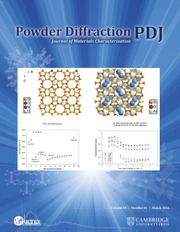Crossref Citations
This article has been cited by the following publications. This list is generated based on data provided by Crossref.
Vanderah, T.A.
Wong-Ng, W.
Huang, Q.
Roth, R.S.
Geyer, R.G.
and
Goldfarb, R.B.
1997.
Crystal structures and properties of Ba4Fe2Ti10O27 and Ba3Fe10TiO20.
Journal of Physics and Chemistry of Solids,
Vol. 58,
Issue. 9,
p.
1403.
Kaduk, J. A.
Toby, B. H.
Wong-Ng, W.
and
Greenwood, W.
1998.
Crystal structure and reference X-ray pattern of Ba4Ti10Al2O27.
Powder Diffraction,
Vol. 13,
Issue. 3,
p.
178.
Zhou, Huanfu
Chen, Xiuli
Fang, Liang
Hu, Changzheng
and
Wang, Hong
2010.
Preparation and Characterization of a New Microwave Dielectric Ceramic Ba4ZnTi11O27.
Journal of the American Ceramic Society,
Vol. 93,
Issue. 6,
p.
1537.
Zhou, Huanfu
Miao, Yanbing
Xu, Jungu
Gong, Jianzhang
Chen, Xiuli
and
Fang, Liang
2015.
Novel middle permittivity ceramic Ba4CoTi11O27: Sintering characteristic, cations distribution, crystal structure and microwave dielectric properties.
Ceramics International,
Vol. 41,
Issue. 3,
p.
5191.
Wang, Nan
Liu, Cong
Wang, Yibin
Cheng, Jingzhen
Gong, Jianzhang
and
Zhou, Huanfu
2016.
Microwave dielectric properties and compatibility with silver electrode of novel low-fired Ba4CuTi11O27 ceramic.
Ceramics International,
Vol. 42,
Issue. 14,
p.
15855.

